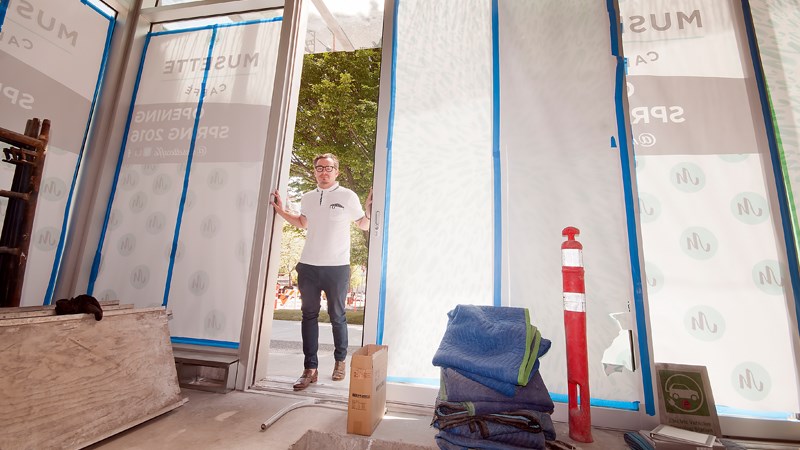Retail spending in British Columbia hit $6.2 billion this April, up 8 per cent from a year earlier, for the strongest increase in the country, according to Statistics Canada.
Vancouver, where booming housing sales and construction and high-tech hiring trump a downturn in the provincial resource sector, is where the discretionary dollar is most in play.
Yet in the city’s restaurant industry, soaring rents and reams of red tape continue to challenge operators and start-ups alike. The intense housing demand is also playing a role.
A recent restaurant closure highlights the danger operators face when they expand too much in a location in the path of condominium developers.
Justin Ault’s landlord had a bailiff change the locks on Ault’s 5,500-square-foot Hapa Izakaya at the corner of Robson and Nicola streets on June 7, after Ault failed to pay three months rent, or nearly $97,000.
Ault had tried to sell the restaurant and the lease but found no one interested in paying the $199,000 asking price.
He still owns two profitable Hapa Izakaya restaurants: a 2,700-square-foot location on Hamilton Street in Yaletown and a 3,100-square-foot bistro on West Cordova Street in Coal Harbour.
What may have doomed the Robson Street Hapa Izakaya, however, was that owners of the 45 condominiums above the restaurant had already voted to aggregate and sell the entire building to a developer.
Optimum Realty representative Andrew Leung, who managed Ault’s Robson Street site on behalf of the landlord, confirmed that the owner has an offer to sell the street-level strata retail units as part of that aggregation.
Ault being behind in his rent gave his landlord the opportunity to kick him out.
The north side of the 1400-block of Robson Street also includes the aging Riviera Hotel and a grassy patch of land that has been vacant for decades. In Vancouver, such prime land has investors circling like hawks.
As Ault reflects on the lesson not to expand too fast in a non-prime location, other restaurateurs say the operating efficiencies of an extra-large restaurant, in a secure location, can deliver a significant payoff.
Glowbal Group owner Emad Yacoub and Tap & Barrel owner Daniel Frankel said that larger restaurants have lease rates based primarily on prime street-front square footage and that having deep restaurants or ones that have basements mean that they can get extra space for virtually nothing.
Indeed high rents, increased labour costs and city requirements that enable fewer washroom stalls per patron in larger restaurants have combined to fuel a trend towards larger facilities.
Yacoub compared the trend of larger restaurants in Vancouver to that of larger planes in the airline industry and larger ships in the cruise sector.
“A larger plane will be more expensive to buy, but just because you’re adding an extra 50 seats, it doesn’t mean that you’re going to need more pilots,” said Yacoub, who opened the 17,000-square-foot, 499-seat Glowbal restaurant at Telus Garden in August.
He said his lease rate is based largely on prime street-front square footage, so having a deep restaurant with a basement that he can use for food preparation and other non-revenue-generating tasks means he can get extra space nearly for free.
The City of Vancouver has complex regulations for how many washroom stalls are needed – and where – but more people per washroom stall are allowed in a 500-seat restaurant than in a 300-seat restaurant. Yacoub said that allows even more square footage to be proportionally freed up for diners.
For some smaller Vancouver restaurateurs, though, the challenge is not to open big but to open at all.
Thomas Eleizegui wants to open a European-style bicycle café near the north end of the Burrard Street Bridge.
But Eleizegui, who planned to open his Musette Café in the spring, is having trouble overcoming the hurdles of trying to operate a business in Vancouver.
“The reason we’re two to three years behind on everything is because the city doesn’t allow you to be imaginative,” Eleizegui complained.
Construction at Musette’s new Burrard street location was being held up because the original building plans failed to comply with city regulations. One of the reasons was a fire exit located through the back kitchen, which inspectors said did not provide a clear enough path for patrons. That required that Musette’s kitchen be moved, an expensive proposition.
City bylaws are needed to maintain basics like fire safety, but Eleizegui questioned whether such regulations give an unfair and advantage to larger companies.
“I find that we’re overrun by big companies that can afford to open up their businesses here and there’s fewer small businesses,” said Eleizegui. “They [large companies] just have the capital to sit and wait.”



